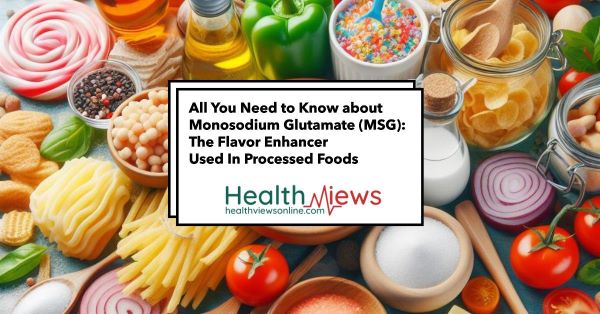In the world of processed foods, achieving the perfect balance of flavors is key to satisfying consumers’ palates. Monosodium Glutamate (MSG) is a flavor enhancer that has become synonymous with umami, the savory taste sensation. While widely used to elevate the taste of various dishes, concerns have been raised about its safety and potential adverse effects. This article aims to provide a comprehensive overview of MSG, including its definition, sources, applications, associated risks, regulatory status, and strategies for minimizing exposure. (Source)
What is Monosodium Glutamate (MSG)- Flavor Enhancer?
Monosodium Glutamate (MSG) is a flavor enhancer derived from glutamic acid, an amino acid found naturally in many foods. It is typically produced through fermentation and commonly appears as a white, crystalline powder with a savory taste. (Source)
What is the List of Foods Containing MSG?
MSG can be found in a wide range of processed foods, including:
- Snack foods (chips, crackers)
- Soups and broths
- Instant noodles
- Processed meats (sausages, deli meats)
- Condiments (salad dressings, sauces)
- Frozen meals
- Restaurant and fast food dishes (Source)
Why is Flavor Enhancer MSG Used in the Food Industry? What are the Applications
MSG serves as a versatile flavor enhancer in the food industry by:
- Amplifying the savory taste of dishes, known as umami, and enhancing overall flavor perception.
- Masking off-flavors and improving the palatability of processed foods.
- Balancing and harmonizing complex flavor profiles in culinary preparations.
- Increasing consumer acceptance and preference for certain products. (Source)
The Risky and Harmful side effects of MSG on Human Health are:
While MSG is generally recognized as safe (GRAS) by regulatory agencies when consumed in moderate amounts, some individuals may experience adverse reactions, including:
- Headaches: Some people report experiencing headaches or migraines after consuming foods containing MSG, although scientific evidence linking MSG to headaches remains inconclusive.
- Flushing: A temporary sensation of warmth, flushing, or sweating has been reported by certain individuals following MSG consumption.
- Nausea and vomiting: Some people may experience gastrointestinal discomfort, including nausea and vomiting, after ingesting large amounts of MSG.
- Allergic reactions: Although rare, allergic reactions to MSG have been reported in sensitive individuals, manifesting as hives, itching, or difficulty breathing. (Source)
What are the FDA regulations for Flavor Enhancer MSG?
The U.S. Food and Drug Administration (FDA) classifies MSG as a food additive that is Generally Recognized as Safe (GRAS) when used within specified limits. The FDA regulates the use of MSG in processed foods and requires its inclusion on ingredient labels when present above certain thresholds. (Source)
List of Diseases Associated with High MSG Levels:
Consuming excessive amounts of MSG has been linked to various health concerns, including:
- Obesity: Some studies suggest that high MSG intake may contribute to weight gain and obesity by stimulating appetite and promoting overeating.
- Metabolic disorders: Excessive MSG consumption has been associated with an increased risk of metabolic syndrome, including elevated blood pressure, cholesterol levels, and insulin resistance.
- Neurological effects: Animal studies have suggested a potential link between high MSG intake and adverse effects on brain health, including neurotoxicity and cognitive impairment. (Source)
How to Minimize the Exposure to Food Chemicals MSG Used in Processed Food?
To minimize potential risks associated with MSG consumption, consider the following recommendations:
- Read food labels carefully and choose products with minimal or no added MSG.
- Cook meals from scratch using fresh, whole ingredients whenever possible to control the amount of MSG in your diet.
- Be mindful of portion sizes and avoid overconsumption of heavily processed foods high in MSG.
- Experiment with alternative seasonings and flavorings to enhance the taste of dishes without relying solely on MSG.
- Monitor your body’s response to MSG-containing foods and limit consumption if you experience adverse reactions.
In conclusion, Monosodium Glutamate (MSG) plays a significant role in enhancing the flavor of many processed foods, but its safety and potential health effects remain topics of debate. By understanding its sources, applications, associated risks, and regulatory considerations, consumers can make informed choices to promote their health and well-being.

Also, Read: All You Need To Know About Butylated Hydroxyanisole, Food Additive E320 Used In Processed Foods
Sources and References:
- U.S. Food and Drug Administration (FDA)
- European Food Safety Authority (EFSA)
- National Institutes of Health (NIH)
- World Health Organization (WHO)
- Food and Agriculture Organization of the United Nations (FAO)
- Scientific journals and peer-reviewed research articles.




